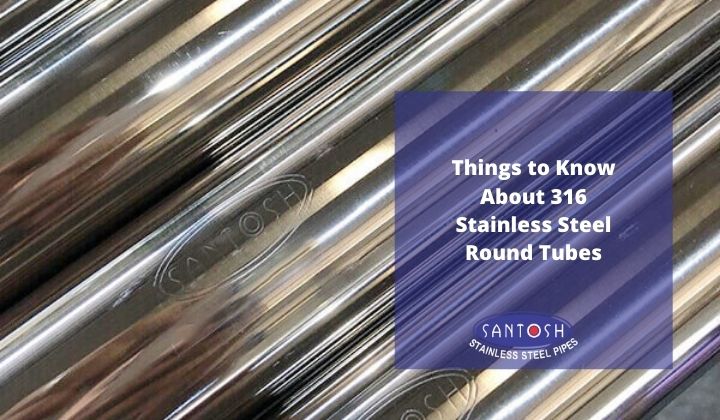
According to the definition, stainless steel is an iron alloy that contains a minimum of 10.5% chromium. There’s an incredible variety of the sorts of alloys available on the market, and they each differ in their exact chemical makeup. Alloying elements like nickel, molybdenum, titanium, carbon, nitrogen, and copper can increase the strength, formability, and other properties of stainless steel. Here we briefly discuss 316 stainless Steel round tubes by Santosh steel in this article
To qualify as stainless steel, it must meet guidelines for corrosion resistance in an exceedingly specific environment. This resistance arises from the metal’s chromium oxide outer layer.
Stainless Steel Round Tubes
Welded stainless steel tubes in Cuttack are created by forming sheets of steel during a tube shape and then welding the seam. Both hot-formed and cold-formed processes are used to create stainless tubing, with the cold process producing a smooth finish and tighter tolerances than hot-forming. Both processes create a steel tube that resists corrosion and features high strength and firmness.
Stainless steel is additionally easily cleaned and sterilized and may be easily welded, machined, or bent to make a line. This mix of things makes stainless-steel tubing a superb choice for structural applications, especially those where the tubes could also be exposed to corrosive environments.
The terms “tube” and “pipe” are frequently used interchangeably, but there are important differences between the two. While they share an identical hollowed shape, steel tubes are measured by their outside diameter (OD) and wall thickness, while steel pipes are measured by their inside diameter (ID). Another difference is that steel tubes are used for structural or aesthetic applications, while pipes are commonly used for the transport of gases and fluids.
Choosing between 304 Stainless steel and 316 Stainless Steel Round Tubes
300-series-grade steel is produced in a range of products, including steel tubes, steel pipes, and various other products. 304 and 316 steel tubes are nickel-based alloys that are low-maintenance, corrosion-resistant, maintain toughness, and are long-lasting at high temperatures. Identifying which grade of steel is good for an application depends on the planned application as well as environmental factors such as temperature or exposure to chloride.
304 stainless steel is corrosion-resistant and easy to cleanse or purify, making it the most common type of stainless steel used for tubing and other steel parts. 304 has been mostly used for building and decorating applications.
316 is commonly similar to 304 stainless steel, is also corrosion-resistant, and is easy to cleanse and purify.
316 stainless steel is more corrosion-resistant, which is caused by chloride, chemicals, and solvents. This additional factor of 316 stainless steel is a good solution for applications which is constantly exposed to chemicals or for outdoor applications where there is exposure to salt.
Applications of 316 stainless steel Round Tubes are used in the surgical industry and marine industry.
Advantages of Stainless steel for tubing applications
Stainless steel is widely used because of its toughness, corrosion resistance, and beautiful appeal. Varieties of benefits include:
• Durability
• Long-lasting
• Better Corrosion-resistant
• Easy to purify
• Light-weight
• Maintenance is low.
• handles high flow rates.
• scratch-proof materials.
• Reusable, recyclable, and environmentally friendly material.
Applications of stainless steel pipes include:
• Food processing industry
• Textile industry and operations
• Water treatment plants
• Oil and gas processing industry
• Construction Industry
• Chemical Industry
• Pharmaceutical industry
• And used in the automotive industry
The Bottom Line
Santosh Steels has a long track record of success in supporting manufacturers in many different industries. We take pride in our inability to work with clients, as we have provided the exact product with exact requirements. Santosh Steels encompasses a strong commitment to service, value, and education. Instead of just selling a product, we look to partner with our customers so as to save them both time and money.